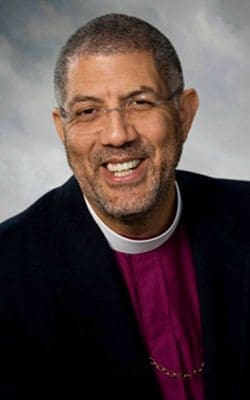Atlanta
Episcopal Bishop Wright to speak at Our Lady of Lourdes
By ANDREW NELSON, Staff writer | Published June 10, 2016
ATLANTA—Our Lady of Lourdes Church has organized a second annual lecture series on justice to honor its heritage of the Sinsinawa Dominican religious community. Episcopal Bishop Robert C. Wright is the special guest to talk to the Catholic community at the downtown Atlanta parish on Wednesday, June 22. All are welcome to attend.
The theme of the evening is “The Power of Mercy.”
“Mercy is a particular category under the big banner of love,” said Bishop Wright in a recent phone interview. It is modeled on how God uses his almighty power on behalf of humanity. “As the Baptists say, God sits high, but looks low,” he said.
“God leaves God’s gated community—called Heaven—and comes to the ghetto, which is Bethlehem and Nazareth,” Bishop Wright said. And those who love God are charged to live like Jesus, reaching out and serving in mercy those who do have less, he said.
Bishop Wright is the 10th bishop of the Episcopal Diocese of Atlanta, which covers north and central Georgia and encompasses 110 worshiping communities. Since becoming bishop in 2012, Bishop Wright has addressed the Georgia lawmakers about gun control, spoken up for Medicaid expansion and been a vocal opponent of the death penalty. In commemoration of the birthday of Dr. Martin Luther King Jr., he prayed with an Atlanta sanitation crew before working a shift on the back of a city garbage truck
Our Lady of Lourdes Church is located at 25 Boulevard, NE, Atlanta, in the Martin Luther King Jr. National Historic Site. Parking is available at 494 Edgewood Ave.
The Sinsinawa Dominican sisters have served for 40 years in the Archdiocese of Atlanta. The lecture series was originated to draw upon their history of advocating for children and the homeless, against the death penalty and for immigrant and women’s rights.
Paulette Lewis, an organizer for the event, said the theme was chosen to reflect the Extraordinary Year of Mercy.
“We came up with the theme because the lecture series highlights social justice activists and the work they do to show mercy and achieve a more just society,” she said.
“We hope that those who attend will be inspired by the work that is being done, learn more about opportunities to get involved, and be motivated to contribute to the work of social justice by getting involved. We believe that the demonstration of mercy has the power to transform lives and minds and behavior of the recipients, those who show mercy, and those who see mercy demonstrated toward others. That is the power of mercy,” said Lewis.
Mercy is about how power is used and on whose behalf is it used, said Bishop Wright. It is different from forgiveness—instead mercy is about being moved to take action on someone’s behalf on behalf of someone who is less powerful, he said.
As an example, he recalled how a gunman invaded a school of Amish children in 2006. The man shot eight girls, killing five of them, before committing suicide. Following the outpouring of support for the Amish community, the people opted to show mercy and embrace the gunman’s widow and his family. The Amish community had the “moral power” and extended it to the other family, he said. “They lost children, but she also lost a husband.”
Another example he mentioned is the relationship between Muhammad Ali and boxing nemesis Joe Frazier. For three years, Ali couldn’t fight or earn an income for refusing to fight in the Vietnam War. Ali used harsh words describing Frazier as a gorilla and an Uncle Tom. But during that ban, Frazier supported Ali and his family financially.
For Bishop Wright, Frazier showed mercy when he acted to share with Ali out of a “deep sense of compassion.”
Even though most people won’t face situations like the Amish or Ali, mercy is still important in life.
“There are 1,000 opportunities to do this in a day. There is eye contact with the homeless person to give them the dignity of their humanity. There is the human contact with the sanitation worker. There is respect and listening to children,” said Bishop Wright.
